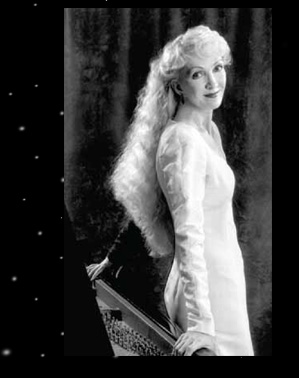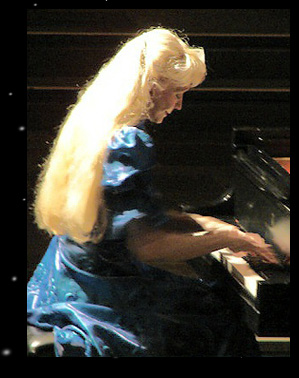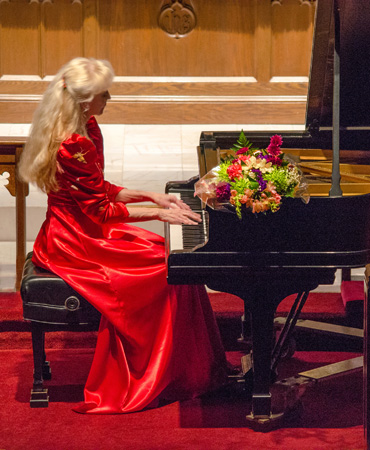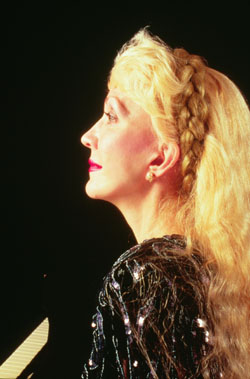Acclaimed Classical Pianist Brings 'Universal Language'
- Teresa Walters “Teresa Walters has played some of the most famous venues in the world. She maintains a very busy concert schedule, and she doesn’t make much of the differences in location. In a few weeks, she’ll perform in Argentina. In a few days, she’ll perform in Wisconsin. She has been dubbed by reviewers as “The International First Lady of Piano.” Walters in her career has received high marks from the New York Times, The Washington Post and The London Times, and she’s performed in almost every state and in more than 30 countries.
“My career has sustained itself in rather miraculous ways,” Walters says. “In this day and age, classical music can struggle in some places, and that’s why each season I like to include a few out of the way places in my tour schedule. It is important to me, and I’m committed to it.” Walters calls Saturday’s program ‘A Celebration of Musical Heritage,’ and that means a lot of interacting with the audience, she said. “Whether performing for a sophisticated audience or for people who are hearing this music for the first time, I think that interacting helps them understand the music, the context, and the perspectives.” “I always enjoy Wisconsin,” Walters said. “I’ve been a cheese lover since I was a child and I enjoy the people very much. I’ve always had good experiences there.” Walters, who grew up on a farm in the Midwest, started playing piano when she was 4 years old. She doesn’t remember how it happened, exactly, but her parents tell her about one particular day at her grandmother’s home. “One day when we were there, some music came on the television,” Walters said. “They tell me that I went to the piano and played what I had just heard. They stopped what they were doing and said, “We didn’t know that she could play!” Walters’s parents signed her up for lessons and a lasting love of piano ensued. Walters went on to gain her doctorate in music from Peabody Conservatory in Baltimore, and she became the first American pianist to perform three anniversary concerts in honor of Franz Liszt’s birthday.
“It is just supremely rewarding. Music is a way to reach out and touch a world that is eternal.” “I think that great music is a link between heaven and earth, and a language understood in every country in the world.” “Classical music goes beyond time and space – a world beyond anything else that I know or can imagine.”
“I believe that as the world becomes, if you will, more unsteady, more unstable, that music is an anchor for the soul and for the human condition, and I believe that it is more important than ever for great music to remain one of the pillars upon which civilization rests.” “These great composers don’t belong to any one country – they belong to all of humanity, forever, and they represent the best of the human spirit. I like to think that music has the potential to bring out the best in all of us." |



 “I believe that as the world becomes, if you will, more unsteady, more unstable, that music is an anchor for the soul and for the human condition, and I believe that it is more important than ever for great music to remain one of the pillars upon which civilization rests. I like to think that music has the potential to bring out the best in all of us.”
“I believe that as the world becomes, if you will, more unsteady, more unstable, that music is an anchor for the soul and for the human condition, and I believe that it is more important than ever for great music to remain one of the pillars upon which civilization rests. I like to think that music has the potential to bring out the best in all of us.” Over the past decade or so, she’s performed in Carnegie Hall, Moscow’s Great Hall, Australia’s International Conservatorium, the Salle Cortot in Paris, and Wigmore Hall in London. But that doesn’t make Wisconsin less important to Walters.
Over the past decade or so, she’s performed in Carnegie Hall, Moscow’s Great Hall, Australia’s International Conservatorium, the Salle Cortot in Paris, and Wigmore Hall in London. But that doesn’t make Wisconsin less important to Walters. “The piano has so much potential – there is such versatility,” Walters said. “You can make it sound like a percussion instrument, or make it sing, or make it sound like a nightingale as in a piece by Granados that I’ll play this season. It is essentially an orchestra at my fingertips. I love all the worlds and the doors it opens, and I love it when I can make that happen for an audience to let them hear and experience all of those things.”
“The piano has so much potential – there is such versatility,” Walters said. “You can make it sound like a percussion instrument, or make it sing, or make it sound like a nightingale as in a piece by Granados that I’ll play this season. It is essentially an orchestra at my fingertips. I love all the worlds and the doors it opens, and I love it when I can make that happen for an audience to let them hear and experience all of those things.” International acclaim for her performances is nice, Walters says, but she would play with or without it. Playing piano feels like “a calling,” something she views “as a gift.”
International acclaim for her performances is nice, Walters says, but she would play with or without it. Playing piano feels like “a calling,” something she views “as a gift.”